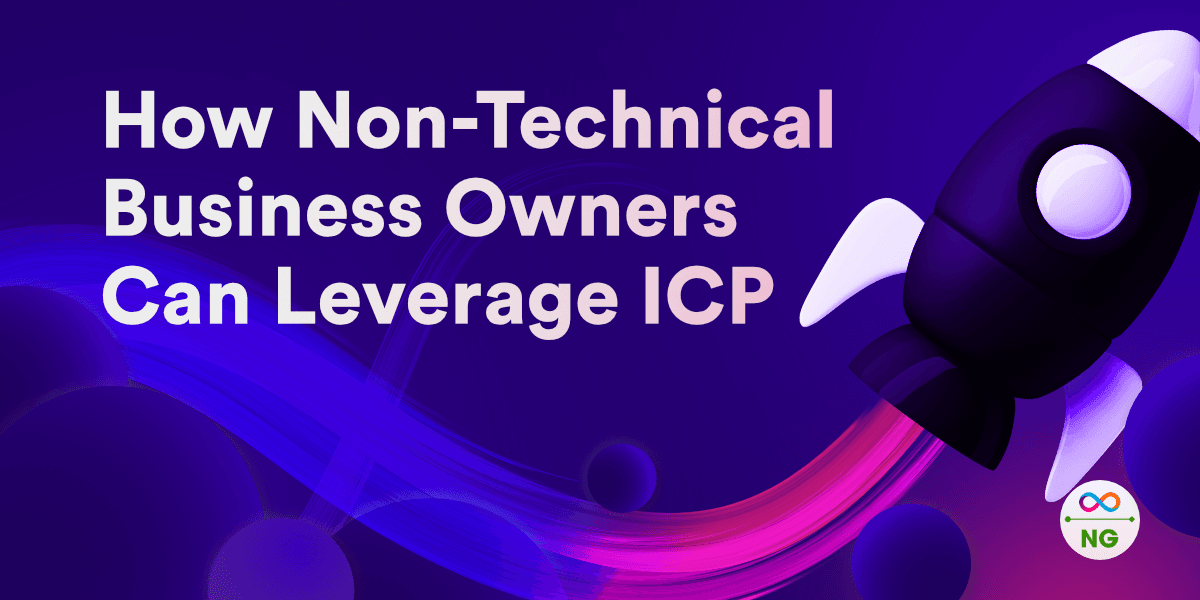Blockchain Transforming Nigerian Businesses: How Non-Technical Business Owners Can Leverage ICP
November 27, 2024

In Nigeria, with nearly 75% of the population accessing the internet via mobile devices, the country’s digital economy is rapidly expanding. Blockchain technology is anticipated to play a critical role in Nigeria’s digital ecosystem as more businesses adapt to decentralized solutions. Statista highlights that in 2023 alone, blockchain adoption in sub-Saharan Africa grew by 40%, showing a strong trend toward innovative business solutions across the continent.
As digital transformation continues to reshape industries, blockchain emerges as a unique tool to empower Nigerian business owners—offering security, scalability, and decentralization. While it might seem intimidating for non-tech entrepreneurs, Internet Computer Protocol (ICP) provides accessible solutions catering to various businesses, from retail and real estate to entertainment and education. This article explores how blockchain can support Nigerian businesses, why non-technical entrepreneurs can benefit from it, and what challenges and prospects lie ahead.
Understanding Blockchain (ICP) and Its Relevance for Nigerian Businesses
The Internet Computer Protocol infrastructure facilitates decentralized applications, websites, and services that operate without relying on traditional cloud providers, reducing costs and improving accessibility. This decentralization opens doors for Nigerian businesses to operate transparently and safely, expanding their market reach.
Business Types That Can Benefit from Blockchain
Blockchain’s wide-reaching potential makes it suitable for various Nigerian industries:
- Retail and E-commerce: Retailers can use blockchain to build decentralized e-commerce platforms, enabling peer-to-peer transactions and eliminating costly intermediaries.
- Real Estate and Property Management: By adopting smart contracts, property businesses can automate transactions and agreements, improving transparency in Nigeria's real estate sector.
- Education and Skill Training: Educational platforms can deliver courses via blockchain, allowing seamless access to content, certificate issuance, and better cost management.
- Entertainment and Content Creation: Creators can use blockchain to reach audiences directly, enabling decentralized streaming and content monetization without traditional platforms that take large fees.
Leveraging ICP by Non-Technical Business Owners
ICP is designed to be accessible, allowing even non-technical users to benefit. Here’s how it caters to non-tech-savvy business owners:
User-Friendly Interfaces:
Platforms built on ICP offer intuitive interfaces that don’t require deep technical knowledge, so business owners can manage their operations without additional training.
Automated Processes with Smart Contracts:
ICP’s smart contracts facilitate transactions and agreements with automated processes, reducing the need for extensive administrative oversight.
Lower Costs through Decentralization:
Traditional server maintenance can be costly and complex; blockchain’s decentralized nature eliminates these expenses, making it accessible and budget-friendly.
Challenges and Prospects for Blockchain Adoption in Nigeria
While blockchain offers substantial benefits, several challenges may hinder its widespread adoption in Nigeria. Limited technical knowledge remains a barrier, as understanding blockchain fundamentals can be challenging for business owners without a tech background, though educational programs could help close this gap. Additionally, Nigeria's inconsistent internet connectivity could affect blockchain operations, as reliable access is essential. Regulatory uncertainty also poses a risk, as the country’s policies around blockchain technology are still evolving, leaving some ambiguity for early adopters.
Despite these challenges, the prospects for blockchain in Nigeria are promising. As more businesses adopt decentralized technologies, blockchain has the potential to drive the growth of digital marketplaces, contributing to a more diverse economy. By providing a secure and transparent platform, blockchain can also improve financial inclusion, enabling underserved communities to participate in digital commerce. Furthermore, as entrepreneurs become familiar with blockchain, they are likely to innovate new services, fostering a competitive market that could boost Nigeria’s GDP.
A Future-Ready Solution for Nigerian Entrepreneurs
Blockchain holds transformative potential for Nigerian businesses, allowing entrepreneurs across different industries to adopt secure, scalable, and decentralized solutions. Whether you’re in retail, real estate, education, or entertainment, the Internet Computer Protocol offers an accessible way to innovate. With a supportive community, accessible interfaces, and a growing blockchain ecosystem, blockchain stands as an attainable gateway for Nigerian businesses ready to leap into the future of digital commerce.
As Nigeria’s economy continues to digitize, embracing solutions like blockchain could help business owners remain competitive, improve operational efficiency, and offer enhanced experiences to customers. While challenges such as infrastructure and regulatory uncertainty remain, the prospects for Nigerian businesses on blockchain are immense—pointing to a promising future for digital commerce on the African continent.
Article by: Mana Lamja